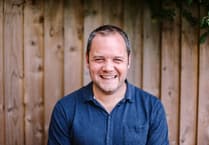THE service at Crediton Methodist Church on Trinity Sunday, May 26, was led by Rev Jeanette Richardson.
In the Methodist Church it is also known as Aldersgate Sunday.
Jeanette said it was a day when we reflect on the ways that God has been revealed to us as Father, Son and Holy Spirit.
It is a time to think about our own meeting with God as we celebrate the day that John Wesley felt his heart “strangely warmed” when he came to understand that the God whom he had worshipped all his life, truly loved him, forgave him his sin and called him to work to make God’s kingdom present.
Both events involve chaos, confusion, peace and new beginnings. Our scriptures open with the words “In the beginning when God created the heavens and the earth, the earth was formless void and darkness covered the face of the deep”.
Into that apparent chaos the breath of God sweeps across the waters and God’s word is spoken – “let there be light” and there was light.
In our opening hymn we sang about meeting with God in the everyday moments of our lives.
Jeanette asked where we have met with God over the past week? Has it been at times that we set aside to be quiet, to open our hearts in prayer, to read scripture, or perhaps listen to songs of worship?
Maybe, over the past week have we met with God in the ordinary activities of the day?
Did we come to church this morning with excitement, hoping to meet with God in new and unexpected ways? Or maybe we came with confidence, confident that somewhere in the prayers, readings, hymns, the breaking of bread, the pouring of wine, we would meet with God?
In Isaiah we heard of a man who went to his local temple. It is not clear if he went to join in a routine service or if he had just decided to pop in for a time of quiet.
Isaiah heard God say “Whom shall I send and who will go for us?” Isaiah had a life changing moment when he said “here am I. Send me”.
Maybe there are folk, who like Jeanette, have had a gradual growth in understanding God’s love. Decades of slowly building on knowledge and experience, decades of questioning, searching and trusting.
Or, perhaps, there are folk here, like John Wesley, who spent many, many years faithfully following the routine of worship, prayer and study, serving those who were in need, speaking of God’s call to repent, and bringing people to faith.
He did all of this yet still felt empty and on the edge of what he saw happening in the lives of others.
Then on May 24, 1738 he, reluctantly, went to a meeting in Aldersgate and there he experienced God’s presence in a way that convinced him, without a shadow of doubt, that he was loved by God, forgiven and set free to be the person he was created to be.
Jeanette asked: “Is that part of your story?”
During the time of Jesus’ earthly ministry there were many who were inspired by the way that He lived, inspired by the things He said and did.
Others were frightened by what His message would mean for their way of life. Anxious that taking on board His teaching would threaten the compromises they made in order to live safely and prosper.
There were some who wanted to know more but were too afraid to show their interest openly because they worried about what their friends and colleagues would think. One such was Nicodemus.
Nicodemus was a well-respected leader and teacher who followed the pharisaic tradition of the Jewish faith. He knew about the teaching and miracles that Jesus had performed and he and others recognised that Jesus was sent by God.
What he had seen and heard also challenged his own understanding. He realised that his knowledge and experience was not complete – that Jesus seemed to have something new to offer.
So, one evening, when it was dark, he went to see Jesus. In this place of external darkness and inner confusion we see God at work.
Later on in John’s Gospel we hear Jesus describe himself as the “light of the world”. We only need light when it is dark. It is often when we feel in dark places that God is powerfully at work.
Nicodemus, a teacher of the law, comes to Jesus, an itinerant preacher who had trained as a carpenter. It must have taken courage and humility to do that.
I imagine he went with the expectation of a sensible conversation – and Jesus talked about the need to be born again! We are used to that concept, but for Nicodemus it was a totally new idea and it didn’t make sense.
Jesus then spoke of aspects of physical birth and the action of wind. Things that Nicodemus may have been more comfortable with. I imagine that when he went home, he still did not fully understand but Jesus had opened up new possibilities for him.
Like Nicodemus we can see God at work in the physical world, we can see God’s power in the sea, and the mountains. We can see God’s amazing creative ability as we look at the beauty of the world, the colour, the variety, the intricate nature of the smallest organism.
As our knowledge of the created world and universe expands, we are continually amazed at the wonder of creation. We can grasp something of God’s wisdom and knowledge as our understanding of science expands, but God is more than that.
In the life of Jesus we see a way of living that is wonderfully free, not bound by the limits we put on rights and wrongs, but a life that is open and full of compassion and joy.
In His death and resurrection we experience something about love and forgiveness. Perhaps, like Nicodemus, we cannot fully explain it, but we can feel it in our hearts.
We feel it because we have received the gift of the Holy Spirit – one who comforts and guides, inspires and challenges and gives us the courage to do things we never expected.
However, in all of that positivity we may also have doubts. Things do not turn out as we expected. We question what we have been taught and sometimes we wonder what it is all about.
The evidence we have from scripture is that it is in the questioning and the doubts that we grow. Think of Thomas, think of Nicodemus.
Jesus did not condemn Nicodemus when he, a teacher of the law, someone who should know what he was about, came to ask questions. He did not condemn Thomas, someone who had been a friend and follower, who had been told about death and resurrection.
He teased them a little, and then took the questions and doubts to a different place - and understanding and faith grew. Jesus did not come into the world to condemn the world, He came that we may all know life in all its fulness.
God loves us and wants us to be whole, to be at peace, to know what it is to be forgiven and set free to forgive others and to become the people we were created to be.
None of us are perfect, but Jesus calls each one of us to follow Him and to make a difference in our world as we share God’s love, mercy, justice and peace.
Bronwyn Nott



-found-by-the-roadside.png?width=209&height=140&crop=209:145,smart&quality=75)

Comments
This article has no comments yet. Be the first to leave a comment.